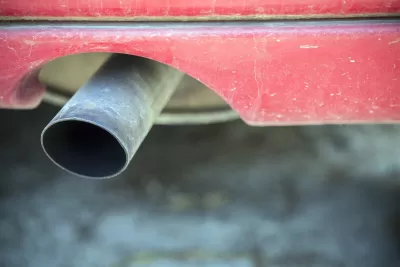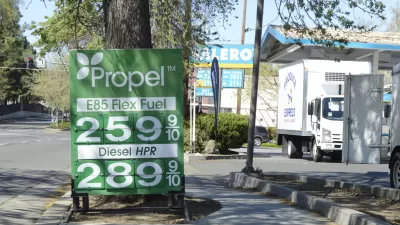Environmental Protection Agency Administrator Scott Pruitt had announced the rollback of greenhouse gas emission and fuel economy standards on April 2. While the auto industry supports the move, not all auto executives agreed.

"An angry Gov. Jerry Brown on Tuesday announced a lawsuit by California and 16 other states [and the District of Columbia] against the Trump administration to stop it from rolling back aggressive national fuel economy standards championed by the state," report Patrick McGreevy and Evan Halper for the Los Angeles Times on May 1.
The lawsuit filed in the United States Court of Appeals for the District of Columbia Circuit, seeks to set aside and hold unlawful the Environmental Protection Agency’s effort to weaken the existing clean car rules.
While the administration has yet to announce how far it intends to roll back the mileage targets, a draft of its plan seen by lawmakers shows it is poised to significantly weaken them. The plan the EPA has drafted with the Department of Transportation would reduce the target from 55 miles per gallon to 42 miles per gallon.
The rollback is listed in the Federal Register on April 13: "Mid-Term Evaluation of Greenhouse Gas Emissions Standards for Model Year 2022-2025 Light-Duty Vehicles." The action indicated is to withdraw from the prior mid-term evaluation listed by the Obama administration during its last week that found that existing technology allows for increased efficiency in model years 2022 to 2025, and therefore the original vehicle emissions standards would remain through 2025.
In addition, EPA will revoke the California Greenhouse Gas Waiver granted to California on July 8, 2009 by the Obama adiminstration that allows it to set its own, stricter standards per the Clean Air Act.
Attorney General Xavier Becerra, "who joined Brown at the Capitol to announce what is the state's 32nd legal challenge to the Trump administration, said the existing clean car standards are achievable, science-based and 'a boon for hard-working American families,'" add McGreevy and Halper.
California has sued the Trump administration on environmental issues more than a dozen times and the state has won each case that has been decided, Becerra said.
EPA Greenhouse gas emissions, fuel economy, and California greenhouse gas emissions standards
"Starting in 2010 during the Obama administration, the EPA, National Highway Traffic Safety Administration and California Air Resources Board established a single national program of greenhouse gas emissions standards formodel year [light-duty] 2012-2025 vehicles," write McGreevy and Halper.
EPA determines greenhouse gas (GHG) emissions standards while the U.S. Department of Transportation, specifically the National Highway Traffic Safety Administration, sets Corporate Average Fuel Economy (CAFE) standards. The distinction between the two standards may provide the basis for the rollback and revocation of the California waiver.
Sen. Tom Carper (D-Del.), the ranking member of the Environment and Public Works Committee, cited a leaked copy of the EPA proposal, which he said argues that "states may not adopt or enforce tailpipe greenhouse gas emissions standards when such standards relate to fuel economy standards and are therefore preempted" by federal law.
“I urge you in the strongest possible terms to abandon this extreme and reckless approach, and to put the administration on a more responsible path,” he wrote in a letter to Transportation Secretary Elaine Chao and EPA Administrator Pruitt.
Distinguishing between GHG emissions and fuel economy standards as it relates to Pruitt's intentions was the topic of a post last year, "Legal Loophole Will Allow Rollback of Fuel Efficiency Standards."
Auto industry position(s)
According to AG Becerra, "the car industry is on track to meet or exceed" the 2025 standards, which was also the finding of the Obama administration's draft midterm evaluation in July 2016. But that apparently doesn't mean the manufacturers want to be held to those standards.
The Alliance of Automobile Manufacturers, the leading advocacy group for the auto industry, sided with Pruitt in their April 2 news statement supporting his announcement on April 2 of his intention to roll back the standards, agreeing with his perspective of making vehicles more affordable, even if less fuel efficient.
Consumer research shows that the monthly payment is the top concern when car-shopping. So, to ensure ongoing fuel economy improvement, the wisest course of action is to keep new vehicles affordable so more consumers can replace an older car with a new vehicle that uses much less fuel – and offers more safety features.
However, all auto industry executives were not onboard with that position, reports Chris Mooney for The Washington Post.
We support increasing clean car standards through 2025 and are not asking for a rollback,” Ford’s executive chairman, Bill Ford, and president and chief executive Jim Hackett, wrote last week. A top executive at Honda has also voiced concerns about where EPA is heading.
California was joined by Connecticut, Delaware, the District of Columbia, Illinois, Maine, Maryland, Minnesota, New Jersey, New York, Oregon, Pennsylvania, Rhode Island, Vermont, Virginia and Washington in the petition [pdf] directed against the EPA and Administrator Scott Pruitt. "This coalition represents approximately 43% of the new car sales market nationally and 44% of the U.S. population," according to Attorney General Becerra.
As for the emissions standards themselves, 15 states have adopted California standards, known as Section 177 states for the section of the Clean Air Act. They are Connecticut, Delaware, Georgia, Maine, Maryland, Massachusetts, New Jersey, New Mexico, North Carolina, New York, Oregon, Pennsylvania, Rhode Island, Vermont, and Washington.
FULL STORY: California joins 16 other states and sues to halt Trump's plan to roll back vehicle emission standards

Planetizen Federal Action Tracker
A weekly monitor of how Trump’s orders and actions are impacting planners and planning in America.

Maui's Vacation Rental Debate Turns Ugly
Verbal attacks, misinformation campaigns and fistfights plague a high-stakes debate to convert thousands of vacation rentals into long-term housing.

Restaurant Patios Were a Pandemic Win — Why Were They so Hard to Keep?
Social distancing requirements and changes in travel patterns prompted cities to pilot new uses for street and sidewalk space. Then it got complicated.

In California Battle of Housing vs. Environment, Housing Just Won
A new state law significantly limits the power of CEQA, an environmental review law that served as a powerful tool for blocking new development.

Boulder Eliminates Parking Minimums Citywide
Officials estimate the cost of building a single underground parking space at up to $100,000.

Orange County, Florida Adopts Largest US “Sprawl Repair” Code
The ‘Orange Code’ seeks to rectify decades of sprawl-inducing, car-oriented development.
Urban Design for Planners 1: Software Tools
This six-course series explores essential urban design concepts using open source software and equips planners with the tools they need to participate fully in the urban design process.
Planning for Universal Design
Learn the tools for implementing Universal Design in planning regulations.
Heyer Gruel & Associates PA
JM Goldson LLC
Custer County Colorado
City of Camden Redevelopment Agency
City of Astoria
Transportation Research & Education Center (TREC) at Portland State University
Jefferson Parish Government
Camden Redevelopment Agency
City of Claremont





























